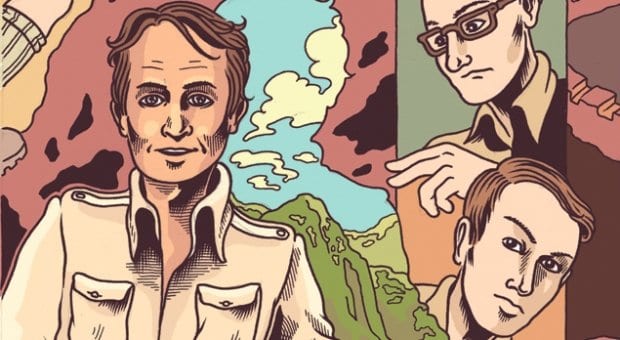British author Bruce Chatwin (1940–1989) no longer disappointments me the way he did when I first encountered him in Grade 12. Living in a rural, potato-obsessed town north of Toronto, it surprised me when my English teacher responded to my saying “I’m gay” with an enthusiastic “Oh, you should do an essay on Chatwin!” I was on the lookout for gay role models at the time, and as I got to know Chatwin by reading his books and the biography Bruce Chatwin by Nicholas Shakespeare, I realized he wasn’t the hero I was hoping for.
Before becoming a travel writer, Chatwin worked at Sotheby’s auction house. He was hired in his late teens to sort objects in the works-of-art department and was made partner by age 26. His success came in part because of his quick wits, but, as I was dismayed to learn, it was probably due more to his good looks and deceitfulness. Part of his job was to spot fakes and forgeries, and he was great at it, but when he got into his “It’s a fake” mood, everything became a fake (whether it was or not). He also regularly engaged in illegal dealings: he once altered a Francis II cabinet from the mid-1500s to make it seem less valuable, bought it (probably under a false name, as was his habit), and then restored it to its original condition and value.
He appeared occasionally in the press, and with his impressive reputation and budding writing skill, he was hired by The Sunday Times Magazine in 1972. His interview with 93-year-old architect and designer Eileen Gray in Paris was pivotal for his career. Gray had two maps of Patagonia she’d painted hanging on her wall. They reminded Chatwin of his boyhood fascination with an object in his grandmother’s cabinet: a supposed piece of brontosaurus skin sent home by a relative living in Patagonia. When Chatwin told Gray he’d always wanted to go to Patagonia, she said that at her age she’d probably never get there and famously told him, “Go there for me.”
Patagonia is a region in southern South America shared by Argentina and Chile. While the area is now more developed and dotted with posh tourist destinations, in Chatwin’s day it was made up mostly of a few disconnected German, Welsh and Boer settlements. Chatwin had a fascination with nomads and went to Patagonia hoping to meet people with stories about wandering. What came out of the trip was his wildly popular first book, In Patagonia (1977). The reputation it earned him as a travel writer would result in extensive world travel (until his early death from AIDS; he was one of the first prominent British men known to have died of the disease).
Chatwin’s book was resented by Patagonians, because when he wheedled them for their personal stories, he often didn’t bother telling them he was going to use them for a book. He also told half-truths about the people he met, basing his descriptions on quick impressions. I recently read the memoir With Chatwin by Susannah Clapp, who was Chatwin’s editor for In Patagonia. In it she admits that In Patagonia “[dangles] the reader between fact and fiction,” but she defends Chatwin by saying (among other defences she provides) there’s no deception in the book since it doesn’t claim to be totally true.
When I was in Grade 12, Chatwin seemed like a shabby con man. Heroes aren’t supposed to lie and fake their way into positions of importance, right? It didn’t help that Shakespeare’s biography led me to believe Chatwin was a repressed gay man hiding from his sexuality in a heterosexual marriage (Clapp disabused me of this belief, writing that he was bisexual and more or less honest about it with his wife). A decade later, I’m no longer desperately searching for heroes, but even if I were, I suspect I wouldn’t be as let down by Chatwin as I once was. My definition of “hero” no longer includes “perfect, tall-building-bounding person.” I can glean more lessons from the life of a real person like Chatwin, who somehow muddled his way through life and, like me, was all too human.
(History Boys appears on Daily Xtra on the first and third Tuesday of every month. You can
also follow them on Facebook.)
(Original illustration by Eric Kostiuk Williams)


 Why you can trust Xtra
Why you can trust Xtra


